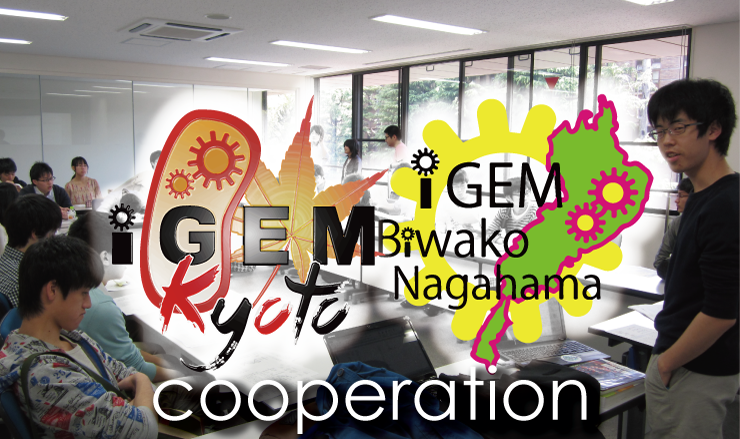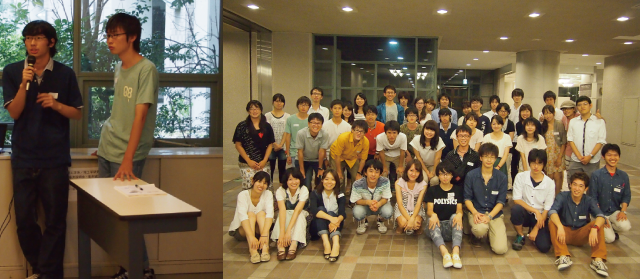Team:Kyoto/Cooperation
From 2013.igem.org
(→Cooperation) |
(→Cooperation) |
||
| Line 2: | Line 2: | ||
<div id="kyoto-main"> | <div id="kyoto-main"> | ||
<div class="texts"> | <div class="texts"> | ||
| - | |||
[[File:Sd.png|center|700px]] | [[File:Sd.png|center|700px]] | ||
==Introduction== | ==Introduction== | ||
Revision as of 22:21, 27 September 2013
count down
Contents |
Introduction
Needless to say, in research, we have to cooperate with others materially and informationally. Otherwise, we cannot expect any development in our research, because working alone only leads us to a deadlock. This is also true to our iGEM activities. However, since iGEM is an organization by only undergraduates, it is difficult to collaborate with the exterior, compared with the general laboratories which have relation with academic meetings. Therefore we face some difficulties which arise when managing the laboratory only by undergraduates. Moreover, we often face difficulties caused by lack of sufficient experience. Because of these special situations, it is difficult for iGEM teams to ask for help to other organizations. However, problems peculiar to iGEM teams are easy to be understood by other teams. Therefore, we iGEM teams have to connect with each other positively. By asking other teams for help, we can smoothly carry out our research, and by helping out other teams, we can reconfirm some problems. Cooperating with other iGEM teams carrying the same problem leads to a hiring the quality of our research.
Support
iGEM has been developing and the number of the teams participating in iGEM has been increasing. There are new teams from many countries every year. The more teams in iGEM, the more viewpoints we get.
By helping each other, we can get out of experimental difficulties and our projects can reach a higher degree of perfection.
However, managing a team by only undergraduates is not easy, because we have to operate the laboratories by ourselves regardless of our knowledge. So, newly joining is very difficult without other team’s help.
Therefore, this year, iGEM Kyoto helped Biwako_Nagahama to establish their team, and succeeded in increasing the number of iGEM teams. We have helped this new team in the ways listed below.
Explaining what is important to establish new iGEM team
We explained what is important in order to establish new iGEM team to Biwako Nagahama.
First, we stated what is necessary for managing their laboratory.
Second, we taught them what Synthetic biology is like, and gave them some technical knowledge required for iGEM.
Finally, we instructed them about BioBrick, which is one of the most important purposes in iGEM. By increasing gene registry, their research may lead to developing biology.
Holding study meeting to manage iGEM team
We taught them our knowledge from our experience, such as how to construct their project and to edit the wiki homepage, which is important in order to manage their iGEM team. Furthermore, we discussed our projects with each other and exchanged advices. By lecturing them, we attained some new viewpoints on our project, and thanks to this discussion, we got a new point of view about our own project. So, this study meeting was meaningful not only for Nagahama, but also for ourselves.
Editing wiki
Even if you have done some experiments and got a positive result, this does not make any sense, unless you express the results to the world. However, the way to express your achievements in iGEM is quite unique and difficult for a green hand. In order to express our achievements in iGEM, we have to make our own homepage. Therefore, we helped making the most basic wiki design frames for Nagahama. We understood what they wanted to edit, and showed them the methods. We also left some comments of the method to edit the page in their source. Thus, we helped the establishments and developments of a new team. Throughout this activity, we contributed to spreading Synthesis Biology.
Link
iGEM JAPAN
iGEM teams in Japan have made efforts to connect with each other by establishing an organization called “iGEM Japan.” iGEM Japan is composed of several iGEM teams around Japan, and is closely connected with each other. iGEM Japan holds the All-Japan meeting twice a year, and a regional meeting once a year. This year, iGEM Japan held the All-Japan meeting in order to deepen our friendship and mutual understanding. In these meetings, we exchange opinions about our own projects and how to manage the teams. Moreover, in addition to these face to face meetings, we connected with other iGEM teams by e-mail or SNS. Such interactions have helped Kyoto and other team's projects as we have showed above. We’ve made sure that we’ll continue to relate with other teams, and deepen our relationship.
International Video Conference
It is important to cooperate not only with domestic teams but also with teams all over the world, because discussing problems with people with different point of views can improve our project. We participated in the video conference sponsored by Purdue, and exchanged opinions about the new standardization of biobricks. We hope these activities will contribute to iGEM.
Assistance
Whenever we carry out a study, we need many processes such as experiments and searching reference. iGEM Kyoto communicates with many other teams, and through this activity, we can cooperate with them and learn many things from each other.
iGEM Kyoto had the help of other teams, as Kyoto helped iGEM Biwako_Nagahama. If iGEM teams increase in number and can cooperate mutually, we’ll be able to perform more outstanding researches. For example, iGEM must get a result in only one year, but when conducting a molecular biology experiment, it takes a long time until we actually start the experiments. This is because concerning the construction of the parts takes time. Therefore, it is desirable for each team to cooperate in such points.
We have been in partnership with Tokyo-tech and NTU-Taiwan. NTU-Taiwan helped constructing our parts.
And, we had the parts sent byTokyo-tech. This is because we couldn’t make usable plasmid from the iGEM DNA Distribution Kit. Therefore, we asked team Tokyo-Tech for usable plasmid, BBa_K193001, which was registered by them in 2009.
By these partnerships, we can perform more speedy experiments, and this will lead to improving the whole level of iGEM.
Conclusion
In iGEM activities, it is important to add partners, connect with them, and cooperate by helping each other. In short, iGEM is realized on the basis of mutual communication. We succeeded in increasing the number of iGEMers, and to teach iGEM Biwako_Nagahama how to manage their team. Moreover, we actually met other iGEM teams in iGEM JAPAN, participated in an International video conference, and cooperated with NTU-Taiwan and Tokyo-tech. iGEM is based on mutual cooperation, so we would like to continue connecting with many teams every year. iGEM Kyoto also respects connections with everyday life, because science is based on the greed to make everyday life better. We conducted our "human practice" as part of its activities.
Sponsors
 "
"










